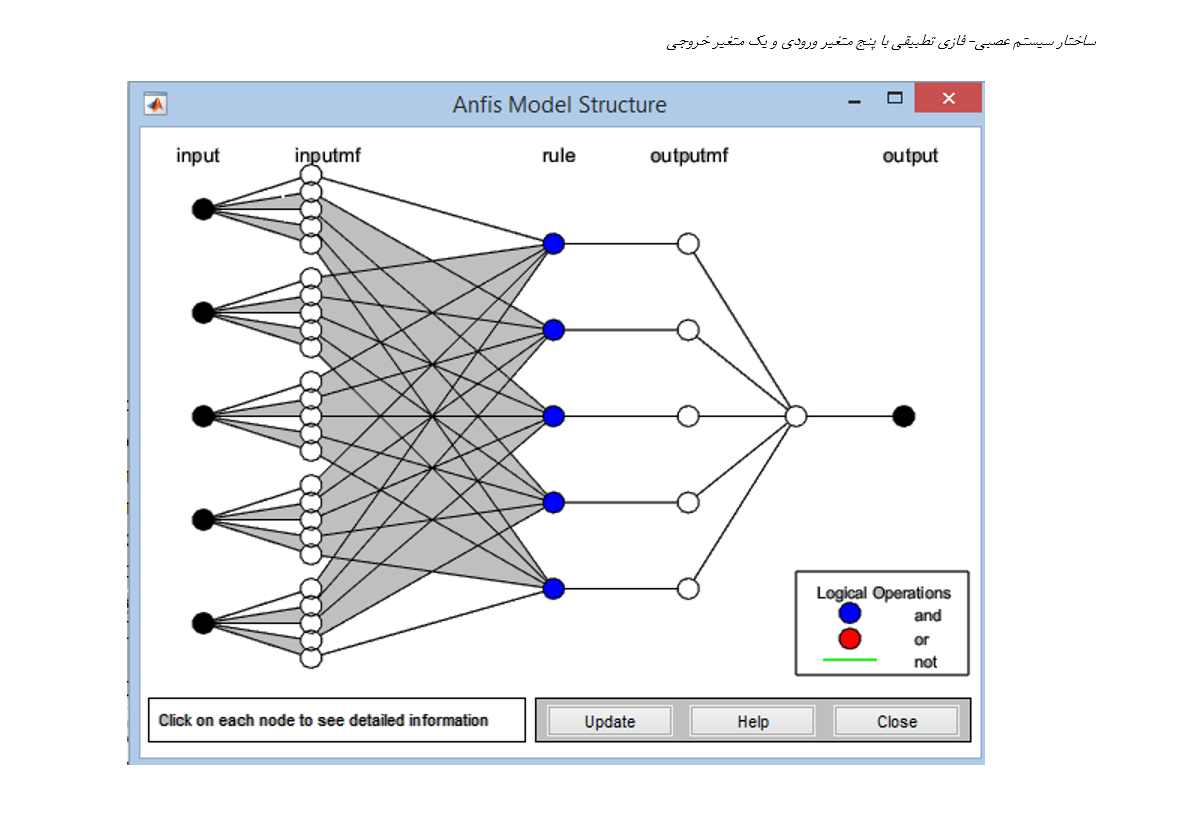Evaluation of Brand Performance Using the Adaptive Neuro-Fuzzy Inference System (Case Study: Iran Insurance Company)
Keywords:
Brand Performance, Adaptive Neuro-Fuzzy Inference System, Iran Insurance CompanyAbstract
Commercial performance is dependent on brand performance. A significant portion of business success stems from brand performance; thus, understanding brand performance based on its evaluation is essential. Accordingly, the purpose of this study is to evaluate the brand performance of Iran Insurance Company using the Adaptive Neuro-Fuzzy Inference System (ANFIS). This research is applied-developmental in terms of its objective and descriptive-analytical in terms of its research method. The statistical population of the study, based on the research variables, includes two groups: managers and customers of Iran Insurance Company. Two questionnaires were used to collect data. The first questionnaire was designed to measure the factors influencing brand performance (system inputs), and the second questionnaire aimed to assess brand performance (output). In this study, confirmatory factor analysis and the Adaptive Neuro-Fuzzy Inference System (ANFIS) were used to evaluate brand performance. The results indicate that the brand performance of Iran Insurance Company was determined to be 3.46. Considering that the system's input and output values were based on a five-point Likert scale, it was concluded that the brand performance of Iran Insurance Company is above average. The system designed in this article can be considered a decision support system that allows brand performance to be evaluated at any moment. This system enables managers to assess their brand performance at any time and, by understanding brand performance, take actions to create and develop programs to enhance brand performance.
Downloads
References
Abubakar, H. S. (2014). Analysis of factors affecting brand loyalty of product among consumers in Nigeria. Developing
Country Studies, 4(6). https://www.iiste.org/Journals/index.php/DCS/article/view/11780
Casidy, R., Wymer, W., & O'Cass, A. (2018). Enhancing hotel brand performance through fostering brand relationship
orientation in the minds of consumers. Tourism Management, 66, 72-84.
https://doi.org/10.1016/j.tourman.2017.11.008
De Chernatony, L., Harris, F., & Christodoulides, G. (2004). Developing a brand performance measure for financial
services brands. The Service Industries Journal, 24(2), 15-33. https://doi.org/10.1080/02642060412331301232
Doyle, P. (2000). Value-Based Marketing. Chichester: John Wiley & Sons. https://doi.org/10.1080/096525400446203
Feiz, D., Motameni, A., Kordnaeech, A., Zarei, A., & Dehghani Soltani, M. (2017). The Impact of Brand Performance
on Brand Competitiveness with an Explanation of the Role of Technological Opportunism. Public Management
Research, 10(35), 159-182. https://jmr.usb.ac.ir/article_3300.html?lang=en
Goyal, A., & Verma, P. (2024). The relationship between brand engagement, brand loyalty, overall brand equity and
purchase intention. Journal of Strategic Marketing, 32(1), 65-79. https://doi.org/10.1080/0965254X.2022.2149839
Guerra-Tamez, C. R., & Franco-García, M. L. (2023). Influence of Flow Experience, Perceived Value and CSR in Craft
Beer Consumer Loyalty: A Comparison between Mexico and The Netherlands. Sustainability, 14, 8202.
https://doi.org/10.3390/su14138202
Kirca, A. H., Randhawa, P., Talay, M. B., & Akdeniz, M. B. (2020). The interactive effects of product and brand portfolio
strategies on brand performance: Longitudinal evidence from the US automotive industry. International Journal of
Research in Marketing, 37(2), 421-439. https://doi.org/10.1016/j.ijresmar.2019.09.003
Kucharska, W. (2020). Employee commitment matters for CSR practice, reputation and corporate brand performanceEuropean model. Sustainability, 12(3), 940. https://doi.org/10.3390/su12030940
Kucharska, W., Flisikowski, K., & Confente, I. (2018). Do global brands contribute to the economy of their country of
origin? A dynamic spatial approach. Journal of Product & Brand Management. https://doi.org/10.1108/JPBM-10-
-1641
Liu, K. N., Hu, C., Lin, M. C., Tsai, T. I., & Xiao, Q. (2020). Brand knowledge and non-financial brand performance in
the green restaurants: Mediating effect of brand attitude. International Journal of Hospitality Management, 89,
https://doi.org/10.1016/j.ijhm.2020.102566
Molinillo, S., Ekinci, Y., & Japutra, A. (2019). A consumer-based brand performance model for assessing brand success.
International Journal of Market Research, 61(1), 93-110. https://doi.org/10.1177/1470785318762990
Morgan, C. (2004). Structure, speed and salience: performance measurement in the supply chain. Business Process
Management Journal, 10(5), 522-536. https://doi.org/10.1108/14637150410559207
Porcu, L., del Barrio-García, S., Kitchen, P. J., & Tourky, M. (2019). The antecedent role of a collaborative vs. a
controlling corporate culture on firm-wide integrated marketing communication and brand performance. Journal of
Business Research. https://doi.org/10.1016/j.jbusres.2019.10.049
Shaw, T. S., Raithatha, M., Krishnan, G. V., & Cordeiro, J. J. (2021). Did mandatory CSR compliance impact accounting
Conservatism? Evidence from the Indian Companies Act 2013. Journal of Contemporary Accounting & Economics,
(3), 100280. https://doi.org/10.1016/j.jcae.2021.100280
Tabelessy, W. (2024). Brand Love: Mediating Effect of the Relationship Between Social Media Marketing, Brand
Loyalty and Brand Equity iPhone Brand Smartphone in Ambon City. Ijir, 2(5), 439-452.
https://doi.org/10.59890/ijir.v2i5.1928
Thakor, M. V. (1996). Brand origin: conceptualization and review. Journal of Consumer Marketing, 13(3), 27-42.
https://doi.org/10.1108/07363769610147929
Thomsen, C. (2022). How to Do CSR With Dialogic Meeting Talk: A Conceptual Framework for Managing Change in
Cross-Sector Social Partnerships. https://doi.org/10.5772/intechopen.94345
Úbeda-García, M., Claver-Cortés, E., Marco-Lajara, B., & Zaragoza-Sáez, P. (2021). Corporate social responsibility and
firm performance in the hotel industry. The mediating role of green human resource management and environmental
outcomes. Journal of Business Research, 123, 57-69. https://doi.org/10.1016/j.jbusres.2020.09.055
Voinea, C. L., Rauf, F., Naveed, K., & Fratostiteanu, C. (2022). The Impact of CEO Duality and Financial Performance
on CSR Disclosure: Empirical Evidence from State-Owned Enterprises in China. Journal of Risk and Financial
Management, 15(1), 37. https://www.mdpi.com/1911-8074/15/1/37
Watson, A., Perrigot, R., & Dada, O. (2024). The effects of green brand image on brand loyalty: The case of mainstream
fast food brands. Business Strategy and the Environment, 33(2), 806-819. https://doi.org/10.1002/bse.3523
Yasmin, H., Basit, A., Naqvi, S. M., & Khan, M. A. (2024). Role of social media platforms in fostering brand loyalty: A
comparative analysis of Instagram, Facebook, and Twitter. Journal of Business Research, 179(1), 115089.

Downloads
Published
Submitted
Revised
Accepted
Issue
Section
License
Copyright (c) 2024 Journal of Technology in Entrepreneurship and Strategic Management (JTESM)

This work is licensed under a Creative Commons Attribution-NonCommercial 4.0 International License.










